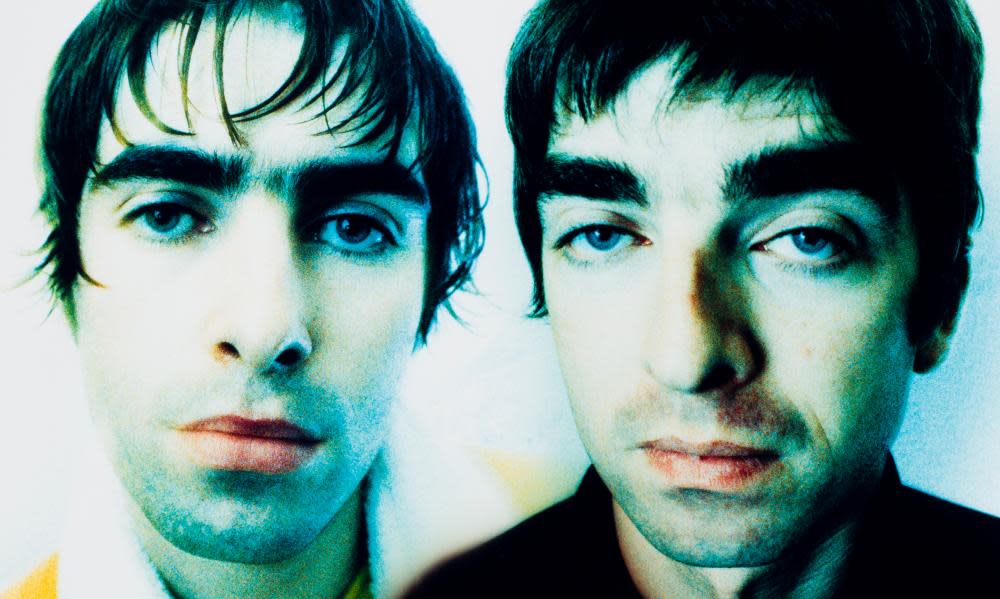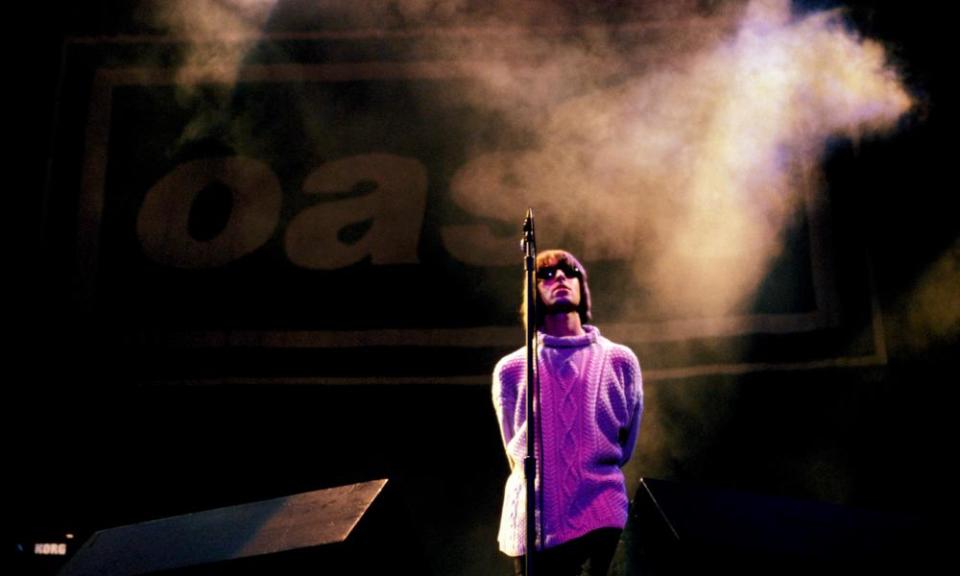Will an Oasis reunion finally happen – and do we really need it?

Crashing into our collective consciousness once again, as inexorable as the tides and almost as frequent, is the suggestion of an Oasis reunion. Liam Gallagher has been unusually generous about his brother’s new single Dead to the World, saying “how can such a mean spirited little man write such a beautiful song” – an improvement on comparing his music to that of arch-nemeses Blur – while Noel has said of a reunion: “He’s got my number. He’s got my manager’s number. Call us … Stop talking on the fucking internet and let’s see what you’ve got to say.”
UN diplomats might have advised more dovish phrasing yet, but by the Gallaghers’ standards they’ve each left a teddy holding some roses on the other’s doorstep. Compare with 2020, when Noel said: “I’ve often thought, ‘Let’s just do a gig.’ But I realised I would only be doing it to shut this fucking idiot up. The only other thing I could come up with was burning his house down or smashing his car in.” Or with 2016, when Liam posted a picture of Noel with the caption “potato”, and then wrote “Fuck Oasis” in block capitals.
By this point, whether Oasis will re-form or not has become as central to the nation’s pop-cultural psyche as who the next Bond will be; were they to reunite, it would not only make both men a staggering amount of money, but potentially make a terrific third act in Britain’s greatest will-they-won’t-they since Elizabeth Bennet and Mr Darcy. As Matty Healy of the 1975 put it last month: “What are Oasis doing? Can you imagine being in potentially – right now, still – the coolest band in the world, and not doing it because you’re in a mard with your brother?”
Like many brothers, they’ve always been at each other’s throats, but in Oasis this was tempered with affection: the most powerful moment of their Knebworth documentary comes during the gig, when they look at each other delightedly, revelling in what they’ve made. Even committed fans of each brother’s solo work since Oasis split in 2009 would admit that their partnership was in cosmic equilibrium: Liam’s attitude is rootless without Noel’s melodies, which in turn need Liam’s catalytic spark.
Not only could it make musical sense, but the bromance would be tied up with a bow. The enmity between Liam and Noel’s then-wife Sara MacDonald seemed to deepen the brothers’ division: “potato” jibes gave way to real nastiness, with Liam saying he didn’t care if Noel and his children were abused online, and Sara responding: “Please god have dropped dead by the time my kids are on social media.” Liam also said Noel was “rite up for [an Oasis reunion] but you know who won’t let him as she doesn’t like Oasis music”. Noel and MacDonald announced they were divorcing earlier this year, and were this a Hollywood movie of brotherly rock stardom, scriptwriters would have him return to Liam to rediscover who he truly is and always had been. Cue another Knebworth gig and run credits. Or would this be too tidy an ending for a band whose fractiousness is part of the appeal? Two of our writers ponder the consequences.
‘It’s not perverse to suggest they’re better apart’

We live in an age when no band is allowed to leave the stage without an encore: after 25 years of re-formations, reunion tours and classic-albums-played-in-full shows, it’s probably quicker to list the legendary bands that haven’t got back together than those that have. Thus the scant handful of holdouts – of bands who could theoretically re-form, but for whatever reason haven’t – have succeeded in bolstering their mystique by the simple expedient of doing nothing: in an age of rock and pop music obsessed with relatability, they seem more distant. Their careers are literally the stuff of legend.
Related: Oasis’s greatest songs – ranked!
So it is with Oasis. By the time they split up in 2009, they had been subject to diminishing artistic returns for more than 10 years, grimly punting out albums so mediocre it made you wonder if they’d ever been any good in the first place – or if the excitement they had engendered in the mid-90s had been a form of collective hysteria, a dry run for the madness that appeared to grip Britain in the wake of Princess Diana’s death. The intervening decades have burnished their myth, the distance enabling you to see their career more clearly: it’s easier to say that the first two Oasis albums, and the songs they relegated to B-sides in the same era, are largely fantastic, without the shadow of what the band would become – a byword for hoary, unadventurous musical toil – hanging over it. Uniquely among their Britpop peers, Oasis’s best songs seem to have cut through to a generation too young to remember them first-hand: look on TikTok and there’s umpteen videos soundtracked by Wonderwall and Stand By Me.
All of which you might take as reasons to re-form, but it’s more than just wilful perversity to suggest it’s somehow better if they remain unreconciled: Noel and Liam constantly sniping at each other feels more Oasis-ish, or at least more redolent of their golden era, than patching up their differences and acquiescing to public demand. The brothers’ volatility, the thrilling sense that the band could – and indeed frequently did – fall apart in a burst of fraternal violence was intrinsic to their initial appeal. Their inability to smooth over their differences in public marked them out as different, and anyone who had grown up with a sibling could recognise themselves in the interminable, cyclical, needling row that erupted in front of an NME journalist in 1994 – “shurrup, you dick!” – and was later released as the Wibbling Rivalry single. The Oasis who doggedly trudged on, because that’s what their fans wanted, or because they could coin it in on tour, or because they couldn’t think of anything better to do – precisely the reasons bands re-form – were no fun at all. Alexis Petridis
‘Seeing the Knebworth film made me rage with jealousy’

There’s little I could say to argue for an Oasis reunion that wasn’t covered last month when Matty Healy, being interviewed by Canadian TV station CBC, went on a minute-long tangent about why the Gallaghers should reconcile, in which he concluded that “there is not one person” who’d rather listen to their solo material than the best of Oasis. Personally, there were parts of Liam’s 2022 album C’mon You Know I didn’t hate – I think it’s charming, at least, that he decided to work with leftfield producers like Vampire Weekend’s Ezra Koenig and Caroline Polachek collaborator Danny L Harle – and found it spine-tinglingly great when I saw him perform Oasis hits during a solo set a few years ago. Fundamentally, though, Healy is completely right: any solo effort from either Gallagher is bound to be a pale imitation of their original band. I’ve only gotten into Oasis relatively recently – I was 12 when they broke up in 2009 – so the entirety of my engagement with the band has been listening to their albums, watching old concert videos and keeping track of Liam and Noel’s endless feud.
Related: Liam Gallagher: ‘Would I give Noel a kidney? Without a doubt’
I thought that hoping for an Oasis reunion was totally futile, so I haven’t held my breath to ever see them in my lifetime. Seeing the 2021 concert documentary Oasis: Knebworth 1996, though, flicked a switch inside of me: watching the epic, stupidly grand show in a cinema with friends, buzzed after pre-gaming at a nearby Irish pub and sneaking in bags full of beers, I felt a deep, rageful jealousy build inside of me over the fact that I could only ever experience something like Knebworth in a cinema environment.
Part of it was the concert itself, sure, but just as much of it was the infectious vibe of Oasis’s wild, insouciant fanbase – despite all the lewdness and public drunkenness, there’s something totally pure about hearing 250,000 people joyfully scream along to Cigarettes & Alcohol or Some Might Say. I’m clearly not the only one totally won over by the wash of manic, euphoric vibes: Knebworth 1996 was the highest-grossing British documentary of 2021, and a live album of the show peaked at No 4 on the album charts. As a wise man once said: “Do me a favour – get back together, stop messing around.” Shaad D’Souza

 Yahoo News
Yahoo News 
